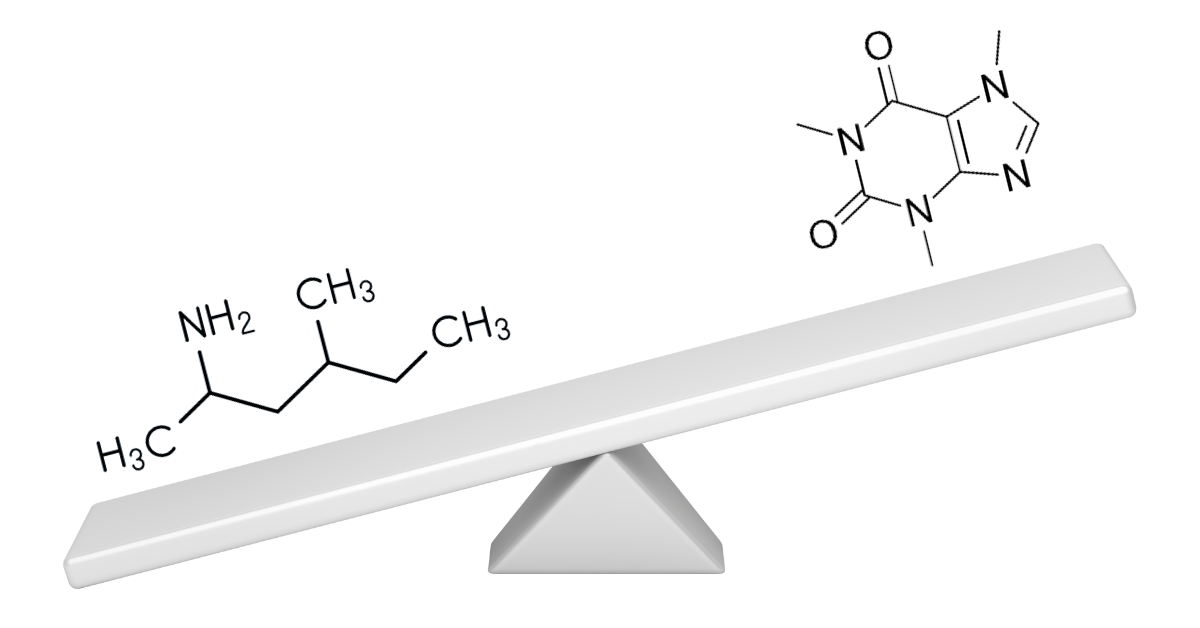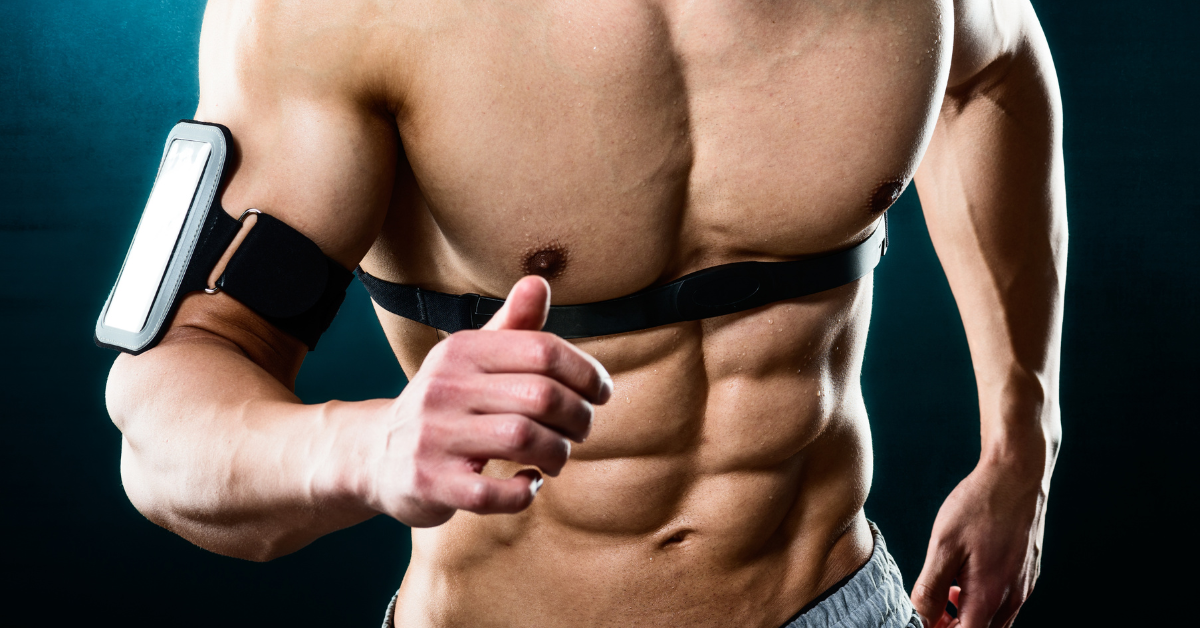
DMAA (1,3-dimethylamylamine) and caffeine are popular stimulants in pre-workout supplements and energy-boosting products.
While they share some similarities, they also have distinct differences in their mechanisms of action, effects, and safety profiles.
This article aims to comprehensively compare DMAA and caffeine, shedding light on their benefits, potential side effects, and the best ways to use them.
Caffeine is a well-known stimulant commonly used to increase alertness and reduce fatigue, with effects generally well-tolerated by most individuals.
On the other hand, DMAA (1,3-dimethylamylamine) is a synthetic stimulant that was once popular in dietary supplements for weight loss and bodybuilding.
Still, it has been linked to serious cardiovascular risks and is banned in many countries.

DMAA, also known as 1,3-dimethylamylamine, is a synthetic stimulant that was originally used as a nasal decongestant.
Today, it's often found in pre-workout supplements and weight loss products due to its ability to increase energy levels and enhance focus.
DMAA is known to act on the brain's reward system to boost energy and on blood vessels to increase blood pressure.
It provides a potent and intense boost in performance, focus, and energy, making it popular among individuals looking for an extra edge during intense workouts or demanding physical activities.
Caffeine is a natural stimulant in tea, coffee, and cacao plants.
It works by stimulating the brain and central nervous system, helping you stay alert and prevent the onset of tiredness.
Caffeine offers a more moderate and sustained energy enhancement and cognitive benefits such as improved focus and concentration.
Its wide availability, familiarity, and extensive research make it popular for those seeking a more versatile and sustained energy boost.
When comparing DMAA and caffeine, several key differences emerge.
First, DMAA is generally more potent than caffeine.
It provides an immediate and pronounced impact, which can be beneficial in various settings, from athletic performance to academic work.
On the other hand, caffeine offers a milder and more widespread energy enhancement with additional cognitive benefits.
Second, the side effects of DMAA and caffeine can differ.
DMAA can cause increased heart rate, elevated blood pressure, and potential risks to cardiovascular health.
While generally safe at moderate doses, caffeine can also lead to side effects like jitteriness, insomnia, and rapid heart rate, especially at high doses.
Finally, the legal status of DMAA and caffeine varies.
Due to safety concerns, DMAA has faced regulatory scrutiny and restrictions in certain countries.
Caffeine, on the other hand, is generally recognized as safe and legal in most countries.
DMAA, or 1,3-dimethylamylamine, is a synthetic drug originally developed as a nasal decongestant.
It is known to act on the brain's reward system to boost energy and on blood vessels to increase blood pressure.
Some promoters claim that it's a safer alternative to ephedrine, but there's no scientific information to back up this claim.
Caffeine is a natural stimulant in coffee, tea, and cacao plants.
It works by blocking the effects of adenosine, a neurotransmitter that relaxes the brain and makes you feel tired.
Unlike DMAA, caffeine does not directly stimulate the brain's reward system or increase blood pressure.

DMAA and caffeine have different effects on the body due to their different mechanisms of action. Here are some key differences:
While DMAA and caffeine can boost energy and improve focus, they have different mechanisms of action and effects on the body.
DMAA acts directly on the brain's reward system and increases blood pressure, while caffeine blocks the effects of adenosine, a neurotransmitter that makes you tired.
It's important to note that DMAA has been associated with serious health risks, while caffeine is generally considered safe in moderate amounts.
DMAA, or 1,3-dimethylamylamine, is a stimulant used in pre-workout supplements and weight-loss products.
It is known to act on the brain's reward system to boost energy and on blood vessels to increase blood pressure.
This can be beneficial in various settings, from athletic performance to academic work.
Some of the benefits of DMAA include:
While DMAA can offer some significant benefits, knowing the potential side effects is important.
These can include:
It's important to note that everyone's response to DMAA can vary, and these side effects may not occur in all users.
However, it's always a good idea to be aware of the potential risks and consult a healthcare provider before starting any new supplement regimen.

Caffeine is a natural stimulant in tea, coffee, and cacao plants.
It works by stimulating the brain and central nervous system, helping you stay alert and prevent the onset of tiredness.
Here are some of the benefits associated with caffeine consumption:
While caffeine has several benefits, it can also lead to some side effects, especially when consumed in large amounts.
Here are some of the side effects associated with excessive caffeine intake:
What is the difference between DMAA and caffeine?
DMAA and caffeine are both energy-boosting substances, but they differ in potency, mechanisms of action, and effects on the body. DMAA provides a more intense and immediate boost, while caffeine offers a milder but sustained energy enhancement.
Which one is better for performance enhancement, DMAA or caffeine?
DMAA is known for its potent performance-enhancing effects, significantly boosting motivation, endurance, and stamina. Although less intense, caffeine can also improve performance by reducing fatigue and enhancing aerobic capacity. The choice depends on personal preferences, goals, and tolerance to stimulants.
Are DMAA and caffeine safe to use?
While DMAA and caffeine can be used safely, exercising caution and considering individual factors is crucial. DMAA has faced regulatory restrictions and safety concerns in some countries. Both substances can cause side effects such as increased heart rate, elevated blood pressure, and potential risks to cardiovascular health. Consulting with a healthcare professional is recommended to ensure safe usage.
What are the side effects of caffeine and DMAA?
Caffeine can cause insomnia, nervousness, restlessness, stomach irritation, nausea, vomiting, increased heart rate, and other side effects. DMAA can elevate blood pressure and lead to cardiovascular problems ranging from shortness of breath and tightening in the chest to heart attack.
Can I consume caffeine and DMAA together?
It's not recommended to consume caffeine and DMAA together. Both are stimulants; when taken together, they can significantly increase heart rate and blood pressure, leading to serious health risks.
Is DMAA illegal?
Due to its health risks, DMAA is banned in several countries, including the United States, Canada, and Australia. The World Anti-Doping Agency also bans it for use in sports.
What are the benefits of caffeine?
Caffeine can help improve physical performance, increase alertness and concentration, and boost metabolism.
Are there any safe alternatives to DMAA for enhancing workout performance?
Yes, there are several safer alternatives to DMAA for enhancing workout performance. These include creatine, beta-alanine, and branched-chain amino acids (BCAAs). Always consult with a healthcare provider before starting any new supplement regimen.
Both DMAA and caffeine are powerful substances known for their energy-boosting properties.
The choice between DMAA and caffeine is personal, based on individual goals, legal considerations, and healthcare professional advice.
Prioritizing your health and safety is essential throughout the decision-making process.
Remember, responsible usage and moderation are key when using any energy-boosting substances.
Be aware of your personal tolerance, monitor for potential side effects, and adjust dosage accordingly.
It is always advisable to listen to your body and make informed choices to optimize your well-being.
Useful Links
 About FitFrek
About FitFrekFitFrek operates as an independent platform, offering comprehensive workouts, programs, routines, guides, and unbiased reviews to accelerate your progress. We pride ourselves on our honesty, delivering straightforward and candid insights. FitFrek does not offer medical advice, diagnosis, or treatment services.